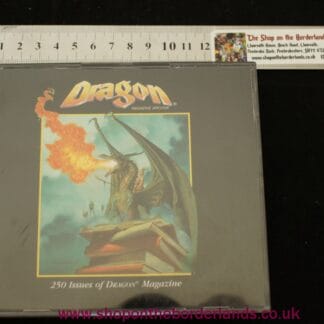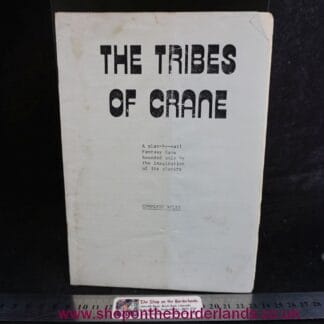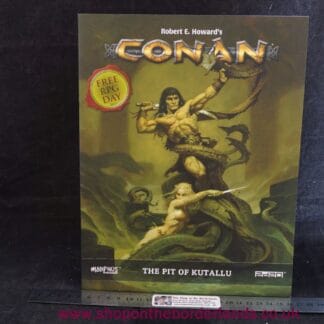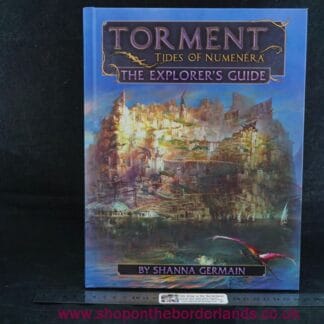Description
Neverwinter Nights (white box edition), PC game
From wikipedia:
“The original scenario supplied with the Neverwinter Nights game engine is known as the official campaign. It comprises approximately sixty hours of gameplay. The gameplay centers on the development of a player character (PC) through adventuring, who ultimately becomes the hero of the story. The PC is tasked with defeating a powerful cult, collecting four reagents required to stop a plague, and finally thwarting an attack on the city of Neverwinter, located along the Sword Coast of Faerûn, in the Forgotten Realms campaign setting of Dungeons & Dragons. The first and final chapters of the official campaign deal with the city of Neverwinter itself, but the lengthy mid-story requires the player to venture into the surrounding countryside and travel northward to the city of Luskan. Along the way, many optional side quests are made available.
As in the Dungeons & Dragons tabletop game, the first thing a player must do is create a new character. The game provides a set of ready-made characters, or the player may create one from scratch. A series of panels are presented for selection of the character’s gender, race, character class, alignment, ability scores (such as strength and intelligence), specialized abilities called skills and feats, in-game appearance, and name. This process grants significant allowance for customization; one can be, for example, an outdoorsman (ranger) or a healer (cleric), then choose skills and feats that would work well with that class in the game.
Following a small prelude, there are four chapters in the original game, with each chapter following part of the general storyline. Within each chapter, there are many quests, subquests, and mini-storylines provided to the player. Depending on the specific quests completed, and the unique items kept, some storylines are continued throughout the entire game, such as the Henchman’s or Aribeth’s tales. Completing many of the side quests will give the player’s character more experience and special items, making them improve more rapidly and continue to make the game easier as the player progresses. These improvements come in the form of levels earned through experience points, with each level providing the protagonist with a set of enhancements as selected by the player.
The game’s mechanics are based on the Dungeons & Dragons 3rd edition rule set; the outcome of most actions, such as combat and skills usage, are randomly determined by dice rolls. For example, when a fighter attacks, the computer would digitally “roll” a 20-sided die (called a d20 in-game) to determine if he hits the target. On a success, another dice is rolled to determine the damage dealt, with powerful weapons assigned to dice with a greater number of sides, due to their ability to do more damage. Although the outcome of nearly all actions is determined by dice rolls, the player does not see them, with the results calculated in the background. However, the player has the option to display the outcomes of these rolls. The player can control the game almost entirely via the mouse.
Multiplayer
A robust multiplayer component separates Neverwinter Nights from previous Dungeons & Dragons games, as this allows players to play on many different servers hosting games. Depending on hardware and bandwidth, each server can support up to ninety-six players on the same server application, plus Dungeon Masters (DMs) to run the games, if desired. Neverwinter Nights game modules are run in a variety of genres and themes, including persistent worlds (which are similar to MUDs), combat arenas (player versus player modules), and simple social gatherings similar to a chat room. BioWare requires that these persistent worlds be free of charge, primarily for reasons of copyright law.
Because Neverwinter Nights lacks a global chat function aside from the supported GameSpy, players typically join pickup games through the game’s multiplayer interface, or schedule games in advance with friends. Matchmaking sites can facilitate scheduling of games, and the experience is much like traditional pen-and-paper roleplaying games. Persistent worlds do this work for them by inviting players to visit their website and continue to roleplay there.
An important feature of Neverwinter Nights is the DM Client: a tool that allows an individual to take the role of the Dungeon Master, who guides the players through the story and has complete control of the server. When it was released, Neverwinter Nights was viewed as the first successful implementation of the feature. The DM Client allows players to participate in regular campaigns, while also allowing persistent world servers to flourish by permitting the DMs of those servers to take control of non-player characters (NPCs) in mid-game for added realism and flexibility. The DM Client also permits the user to spawn and control masses of monsters and NPCs much in the same way as units would be controlled in a real time strategy game.
Neverwinter Nights ships with the Aurora toolset, which allows players to create custom modules for the game. These modules may take the form of online multiplayer worlds, single player adventures, character trainers or technology demos. Additionally, several third party utilities have further expanded the community’s ability to create custom content for the game. By the end of 2002, there were over 1,000 custom adventures available.
Custom content creators are known as builders in the Neverwinter Nights community. The Aurora toolset allows builders to create map areas using a tile system; the appearance and surface textures of the area are defined by the area’s selected tileset. Builders can overlay placeable objects onto areas, and use the built-in scripting language NWScript, which is based on the C programming language, to run cut scenes, quests, mini-games and conversations. Third party utilities allow builders to create custom content for most aspects of the game, ranging from new playable races and character classes to new tilesets, monsters and equipment. Custom content is added to the game in the form of hakpaks. Builders have used the Aurora toolset in combination with hakpaks to create playing experiences beyond the scope of the original campaign. Additionally, the Aurora toolset has allowed for the creation of a number of ongoing persistent worlds modules.
Despite the game’s age, the Neverwinter Nights custom content community remains active. The community, mostly centered on the Neverwinter Vault, has created over 4,000 modules for the game, among them, many award-winning adventures and series such as Dreamcatcher.”
Originally for Windows 98 and XP machines. This looks to be complete. However, note that this budget white box edition does not come with the map and manual that the original black box edition had.I have not tested it to see if it works on modern operating systems and modern PCs. If you buy it and find that it doesn’t work, please contact us immediately to sort out a refund.
Additional information
| Condition |
|---|







